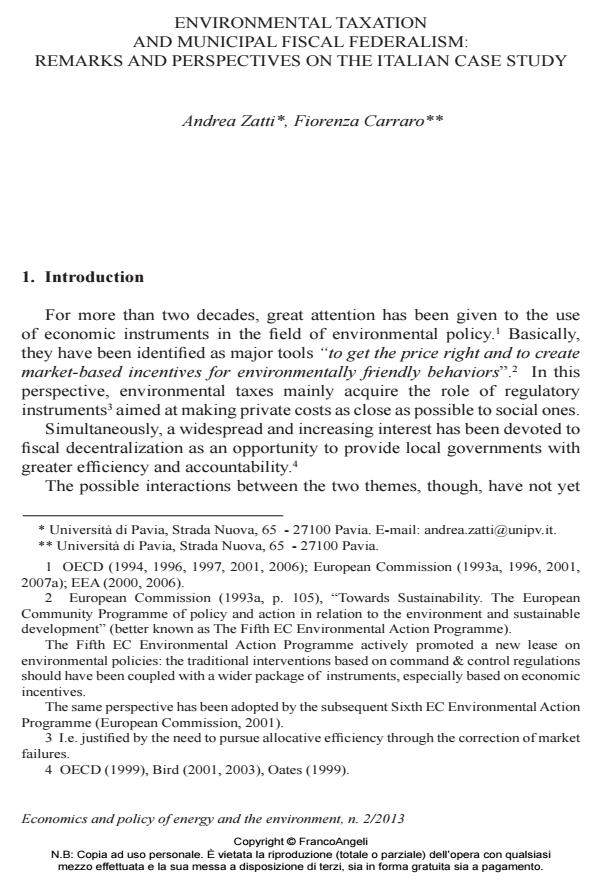Environmental taxation and municipal fiscal federalism: remarks and perspectives on the Italian case study
Titolo Rivista ECONOMICS AND POLICY OF ENERGY AND THE ENVIRONMENT
Autori/Curatori Andrea Zatti, Fiorenza Carraro
Anno di pubblicazione 2013 Fascicolo 2013/2
Lingua Inglese Numero pagine 32 P. 61-92 Dimensione file 669 KB
DOI 10.3280/EFE2013-002005
Il DOI è il codice a barre della proprietà intellettuale: per saperne di più
clicca qui
Qui sotto puoi vedere in anteprima la prima pagina di questo articolo.
Se questo articolo ti interessa, lo puoi acquistare (e scaricare in formato pdf) seguendo le facili indicazioni per acquistare il download credit. Acquista Download Credits per scaricare questo Articolo in formato PDF

FrancoAngeli è membro della Publishers International Linking Association, Inc (PILA), associazione indipendente e non profit per facilitare (attraverso i servizi tecnologici implementati da CrossRef.org) l’accesso degli studiosi ai contenuti digitali nelle pubblicazioni professionali e scientifiche.
The debate around green fiscal reform has been going on for more than 20 years in Europe. However, to this day the focus has been mainly (or almost completely) concentrated on national fiscal systems, while the local dimension has been largely ignored. Environmental taxes, or at least some of them - final energy consumption taxes, car registration and circulation taxes, construction fees, park and road pricing, charges on tourism, land use and occupation fees - are strongly interrelated to the territorial context and, accordingly, can represent a promising tool to make citizens and city users pay for the services they benefit from or for the external effects they generate. From a multilevel governance perspective, whenever a process of fiscal decentralisation is going on or planned, major attention can be directed to the opportunity to fill in the fiscal gap, at least to some extent, through a major recourse to environmentally related taxes. The expected results (dividends) would not just be in terms of a less distortionary fiscal system, but also of a more transparent and accountable model of financing for local expenditures and functions. The paper provides a preliminary assessment on this subject, focusing mainly on the Italian experience. The categorization of environmental taxes and their quantitative analysis show how no specific attention has currently been given to the local dimension and how major research efforts still have to be done to better investigate their potential role in the context of decentralisation processes.
Parole chiave:Environmental taxes, fiscal decentralization, local environmental fiscal reform
Jel codes:H23, H71, H77
- Environmental taxes and green fiscal reform in Italy: An update Andrea Zatti, in ECONOMICS AND POLICY OF ENERGY AND THE ENVIRONMENT 1/2019 pp.31
DOI: 10.3280/EFE2018-001003
Andrea Zatti, Fiorenza Carraro, Environmental taxation and municipal fiscal federalism: remarks and perspectives on the Italian case study in "ECONOMICS AND POLICY OF ENERGY AND THE ENVIRONMENT" 2/2013, pp 61-92, DOI: 10.3280/EFE2013-002005